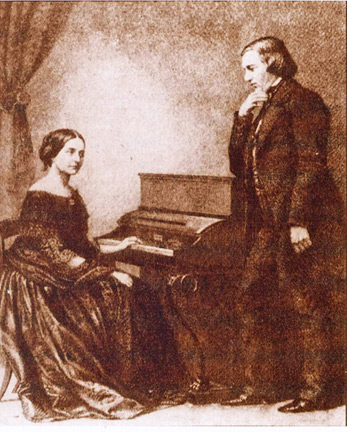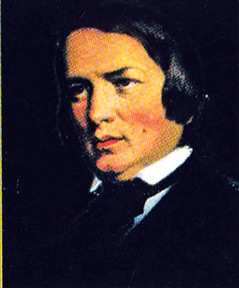|
Robert and Clara Schumann:
The brilliant composer – pianist combination
by Gwen Herat
If ever there were a couple who together could have produced
magnificent scores, it was Robert Schumann and his wife, Clara (Wiock)
who mesmerised the world of classical music overcoming many obstacles
made to prevent their marriage. A strong relationship that father-in-law
to be, Fedrich Wiock violently opposed.
The battle for his daughter's hand lasted for seven long years. He
forced them to stay apart and initiated a personal vilification campaign
against Schumann. Clara would insist on what her father rejected and
ultimately succeeded in court where the judgement was given in their
favour.
Robert and Clara married in September, 1840 which was a day short of
Clara's twenty first birthday. With love and understanding for each
other, their career entered a new phase in musicality. She at the piano
and he at composing. In 1840 alone, Schumann wrote over 100 songs and in
the following sketched out his Symphony No. 1 in B flat in just four
days. It was known as the ‘Spring’ Symphony. Many of Schumann's
brilliant scores followed very quickly. Clara was intensely ambitious
for quick movement which threw him off his balance. It was not easy for
a pianist to practise and a composer to work in silence and they found
it hard to balance.
Determination
|

The magical combination of pianist/composer, Clara/Robert
Schumann who mesmerised the world of classical music. |
During those rising years, he told someone ‘Everything beautiful is
difficult, the short the most difficult’ but with determination scored
such vibrant pieces such as:
Symphony No. 1,
in B Major. OP 38
Andante un poco
maestoso
Larghetto
Scherzo
Allegre animato
c grazioso
Symphony No. 2 in
S Major, OP 61
Allegro ma non troppo
Scherzo. Allegro vivace
Adagio espressive
Allegro molto vivace
Early years
Famous for investigating the Romantic's obsession for feeling and
passion, he continued its research thoroughly and came out exceedingly
accurate. Born into a well-to-do family, Schumann was the son of a Saxon
bookseller and publisher.
Cultured and respected in his community, young Schumann was the fifth
child among several. His parents were not musically gifted but
encouraged their son's aspirations to be a musician.
When he was barely 10, his parents commenced his piano lessons and
their persuaded him to study law in Leipzig. The young Schumann was
trained under the famous composer, Frederich Wiech who was later to
become his son-in-law.
|

Robert Schumann 1810-1856 |
However, tragedy hit Schumann that twisted and turned his paths that
prevented his travelling. His elder sister, Emille committed suicide in
1826 and after a short time his father died leaving him devastated.
Among his three brothers, only one reached middle age. To take his
mind off personal tragedy, he engaged himself in the fashionable
Romantic malaise of Weltschmerz or better known as world-weariness.
It led many to die young in romantically tragic circumstances. With
his mother's blessings, he had the opportunity to study music again
under Fredrich Wiech. When everything was going all right, tragedy hit
him again. His middle finger was rendered lifeless after he developed an
ailment which crippled and put an end to his career as a pianist.
Another disaster followed when he was diagonised with syphilis and the
treatment for it had side effects of mercury being used.
Insomnia
Schumann was a handsome man who enjoyed the company of women one of
whom had infected him with syphilis. It resulted in bouts of insomnia
along with aural hallucinations. He recorded them in his diary and was
afraid of going mad. He thought of putting an end to his life. However,
through the decades that followed, his career as a composer grew from
strength to strength. He also developed literary activities that made
him a sharp critic of the era.
Schumann's musical criticism was as fine as the style of his prose.
He formed an association of intimate friends called Davidsbundler which
meant David against Philistines. The group opposed philistinism in the
arts and gave support to new and imaginative people.
In return, Schumann immortalised his friends in his piano score of
Davidsbundlertanze. He rose fast and famous with Clara besides his
translating his scores on keyboard. However, he was not happy on being
introduced as Clara Schumann's husband. It made him small.
While touring Russia, he returned to Clara as his mental health began
to fail. He resigned from his teaching post that Mendelssohn had created
for him at the conservatory in Leipzig and moved over to Dresden and
accepted the post of music director, Dusseldorf. It proved another
disaster as Liszt and Wagner found him boring.
He tried to kill himself drowning in the Rhine and was rescued and
placed in an asylum at his own request. Schumann lived for another two
years under this hallucination and refused to see Clara and his seven
children.
However, Clara visited him later and found him aged so much that she
was hardly able to recognise the once handsome husband of hers. She was
shaken with his condition and moved to tears. Schumann died in her arms
and was buried the following day in Bonn.
His music
He wrote the finest music for the piano followed by songs and wrote
less for the voice as he mainly concentrated to reach every heart of
pianists. His melodic facility was extraordinary and made him a worthy
successor and companion to Schubert.
There was tenderness, passion, and enormous repertoire like in
sensitive literature of Shakespeare. Schumann was gifted at writing
poetry, prose, verse and stanzas. They all melted into his works that
were found missing in the works of other great Romantics. The lyrical
beauty he summoned at will, their warmth and beauty, silenced all
critics once and for all.
And such a great composer died the cruellest and most unromantic
death.
His selected music
Piano music
Carnival, OP 9 (1835) This was word play which Schumann loved most in
a captivating collection on four notes. He wrote it for Ernestine von
Frick when he was in love with her when in a brief departure form Clara.
Written in German notations as notes A, E flat, C and B natural becomes
A, Es.
Fantasiestuck OP, 12 (1837) Schumann used two pen names for them:
Zeitschrift and Musik. The personality of forceful and dominant gentle
dreams. Etudes Symphoniqe Op 13 (1834-52) a theme of 12 variations
describing the work Kinderszened, OP 15 (1838), an album of childhood
dreams through an adult's eyes.
Fantasie in C, Op 17 (1838) dedicated to Liszt, yet another revered
piano work. Schumann wrote for Clara. It is a pure stream of beautiful
melody.
Orchestral music
Symphony No. 1 in B flat, Spring, OP 38 (1841), Symphony No 3 in E
flat, Rhenish, OP 97 (1850), They are Schumann's fresh four symphonies
and the best especially ‘Spring’ that is attractive and bursting with
energy, graceful and melodious. Rhenish called the Cathedral Scene is an
evocation of the enthronement of a cardinal in Cologne Cathedral which
Schumann had witnessed and dedicated to him. |

